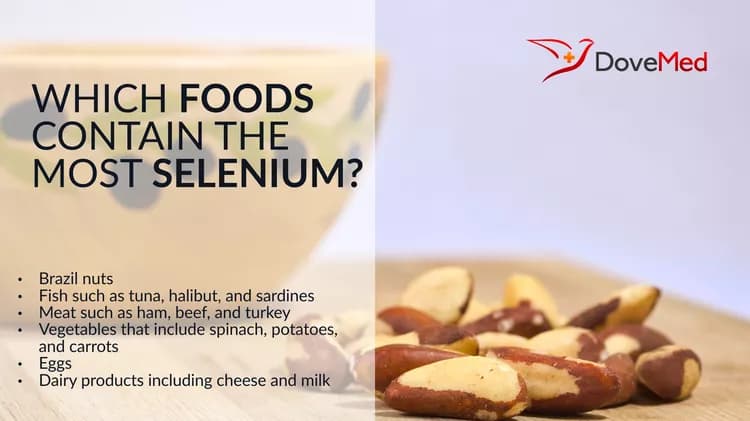The human body requires many minerals, among which selenium is an important and indispensable one. However, it is required in very little quantities, and hence, it is known as a trace element or a micronutrient. We receive selenium mostly from the food that we consume and in some cases, through dietary supplements. Normally, a regular diet that consists of whole grains, seafood, meat, vegetables, fruits, and nuts may make-up for the body’s requirement of selenium.
Selenium in the body binds to proteins and form selenoproteins, which are vital to the body and perform a diverse set of functions. These include reproduction, DNA synthesis, and providing antioxidant protection and anti-inflammatory properties through enzymes that contribute to the body's detoxifying systems. In addition, selenium-enzymes contribute to normal thyroid gland function by serving as catalysts for the transformation of hormone T4 to T3.
Selenium also plays a key role in the treatment of major diseases and disorders such as stroke, atherosclerosis, bone-related disorders like rheumatoid arthritis and osteoarthritis, eye disorders like cataract and macular degeneration, infertility and even in the prevention of miscarriages. It has been researched that selenium may contribute in the fight against cancer, chiefly prostate, lung, and skin cancer; to fight infections, such as bird flu and HIV/AIDS; and prevent cognitive decline. However, many studies are still being conducted to firmly assess the effectiveness of selenium in the treatment of various conditions.
According to the US National Academy of Sciences, Food and Nutrition Board, the recommended dietary allowance (RDA) of selenium for adolescents and adults (both males and females) is between 40-55 micrograms/day. Different age groups have different selenium requirement quantities. The RDA during pregnancy is 60 micrograms/day and higher at 70 micrograms/day for lactating mothers.
The following is a list of foods high in selenium:
- Brazil nuts: These contain a very high concentration of selenium, and regular consumption of brazil nuts in not advised (per National Institutes of Health)
- Fish such as tuna, halibut, and sardines
- Meat such as ham, beef, and turkey
- Organ meat, which refers to the internal organs of a slaughtered animal such as a goat, lamb, sheep, pig, etc. The internal organs may include the liver, kidneys, heart, intestines, tongue, and even the head. Organ meat is also known as offal.
- Vegetables that include spinach, potatoes, and carrots
- Eggs
- Dairy products including cheese and milk
With selenium, optimum body levels have to be maintained, as any excess or deficient levels may lead to adverse health problems. Selenium toxicity may occur due to excess consumption of foods highest in selenium and it may cause nausea, skin lesions, garlic breath odor, fatigue, irritability, hair loss, etc. Acute toxicity may cause serious complications and can be fatal. Selenium deficiency may occur on account of selenium-poor soils in individuals who undergo long-term kidney dialysis or in patients suffering from HIV. However, the use of selenium supplements should be under prescription only. It is always recommended to take the advice of a suitable healthcare professional before bringing any alteration to your regular food habits and diet.
Related Articles
Test Your Knowledge
Asked by users
Related Centers
Related Specialties
Related Physicians
Related Procedures
Related Resources
Join DoveHubs
and connect with fellow professionals


0 Comments
Please log in to post a comment.